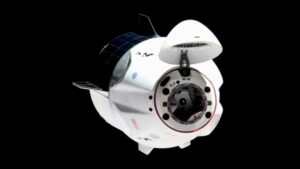One mission would launch between the fall of 2022 and the middle of 2023, while the second would take place in the second half of 2023.
NASA’s low Earth orbit commercialization policy, released two years ago, allows two private astronaut missions a year to the station for short stays. NASA says that the two mission opportunities it is requesting proposals for would involve up to four astronauts each, staying at the station for no more than 14 days.
Companies seeking either of the two opportunities have to submit proposals of no more than 30 pages by July 9. Those proposals have to explain how their missions fit into NASA’s LEO commercialization strategy and provide information about who would fly and how, and the business approach for the planned mission.
The first private astronaut mission under the policy is Axiom Space’s Ax-1 mission, scheduled for early 2022 on a SpaceX Crew Dragon spacecraft. It will carry three paying customers and a former NASA astronaut, Michael López-Alegría. The overall mission will last 10 days, including seven or eight days docked at the ISS.
Axiom has already started preparations for future missions. The company announced May 25 that another former NASA astronaut, Peggy Whitson, will command the company’s Ax-2 mission, with one customer, John Shoffner, serving as pilot. The two will also serve as backups for the Ax-1 mission.
Axiom announced June 2 that it signed a contract with SpaceX for three future missions — Ax-2, 3 and 4 — using Crew Dragon spacecraft. Those missions, the companies said, cover flight opportunities through 2023.
However, Axiom Space executives have acknowledged that they will have to compete for those future opportunities for private astronaut missions. Demand for private astronaut missions is greater than the two opportunities per year currently available, NASA officials said at a May briefing where they announced they finalized the agreement with Axiom for the Ax-1 mission. The “traffic model” of visiting vehicles at the station prevents NASA from supporting more private astronaut missions.
“We’re prepared to fly on a cadence of about twice a year, but like everyone, we have to compete for the opportunity,” Mike Suffredini, president and chief executive of Axiom Space, said at the briefing.
It’s unclear who else would compete for the missions. Space Adventures has an agreement with SpaceX for a Crew Dragon flight that would go not to the ISS but instead into a higher orbit as a standalone mission. However, the company has not given an update on plans for that flight, even as it works with Roscosmos on a dedicated commercial Soyuz mission in December that will send Japanese billionaire Yusaku Maezawa and his assistant to the station.
Phil McAlister, director of commercial spaceflight development at NASA Headquarters, said in an agency statement that interest in private astronaut missions was another sign of a “renaissance” in human spaceflight made possible by commercial crew vehicles. “As more people fly to space and do more things during their spaceflights, it attracts even more people to do more activities in low Earth orbit and reflects the growing market we envisioned when we began the commercial crew program 10 years ago.”



